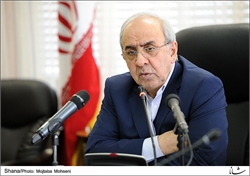 Tehran, Jan 1, IRNA -- The Oil Ministry every month doles out $1.2 billion of its revenues as part of the funding for the subsidy reform plan, and this is visibly hurting the key industry, deputy oil minister Mansour Moazzami said.
Tehran, Jan 1, IRNA -- The Oil Ministry every month doles out $1.2 billion of its revenues as part of the funding for the subsidy reform plan, and this is visibly hurting the key industry, deputy oil minister Mansour Moazzami said.'Major oil projects are suspended because of the amount we have to contribute to the (cash) subsidy program,' he said on the sidelines of the 9th annual congress of the Iranian Oil, Gas and Petrochemical Products Exporters Association in Tehran.
Under a five-year plan launched in December 2010, and promoted as an �economic revolution� by former president Mahmoud Ahmadinejad, Iran began slashing three-decades-old subsidies on sensitive energy and food items, replacing them with monthly cash payments to the entire nation irrespective of their economic status.
According to the Institute for Energy Research (IER), Iran leads the world in fossil fuel consumption subsidies. In 2013, it allocated around $84 billion from government resources to lower the cost of fossil fuels for end-users.
Speaking to IRNA, Moazzami also criticized the process of privatization in the oil industry and said, 'Operations at several privatized units have come to a halt due largely to wrong policies and the lack of effective oversight.'
He said many companies in the oil industry have been allocated haphazardly to undeserving people and groups, and added that privatized refineries and petrochemical units have pile up 'billions of dollars in debt' to the oil ministry for the feedstock they received over the years.
The senior official underlined oil as a 'political commodity' and said the recent downward spiral in international crude prices were influenced by political parameters.
Saudi Arabia, Kuwait and UAE were on the receiving end of falling prices more than other producers, he said, adding that the world economy cannot bear further price cuts. However, he stressed that plummeting oil prices have 'not greatly harmed Iran', which also depends largely on oil export revenues.
There are plans to increase gas production capacity by 100 million cubic meters, bringing in $7 billion in revenues annually, according to financialtribunedaily.com. As part of the plan, the Persian Gulf Star Refinery (PGSR) in south Iran is slated to start operations by the end of March 2016. It will increase daily gas production capacity to 3 million barrels per day when fully operational.
The refinery is designed to produce 360,000 of petroleum products on a daily basis. According to estimates, Iran will need to import 5-6 million liters of gasoline per day until the Persian Gulf Star Refinery comes on stream. Additionally, a bill is under assessment by the parliament to permanently allocate 20 percent of the PGSR shares to the National Petrochemical Company (NPC).
The official also said Turkey is a customer of Iranian gas, but plan for gas exports to the northwestern neighbor was postponed to the next year due to the situation in Iraq. Gas export to Oman, among other regional states, is also on the cards.
There are plans to build the largest gas condensate refining complex in the port city of Siraf in Bushehr Province. Construction of the complex, comprising eight refineries with a total capacity of 480,000 barrels per day is due to commence early next year.
The deputy minister said 54 companies submitted proposals to undertake the construction of Siraf refineries. Ultimately, eight firms were awarded, of which six are private companies.
By IRNA
The Iran Project is not responsible for the content of quoted articles.










